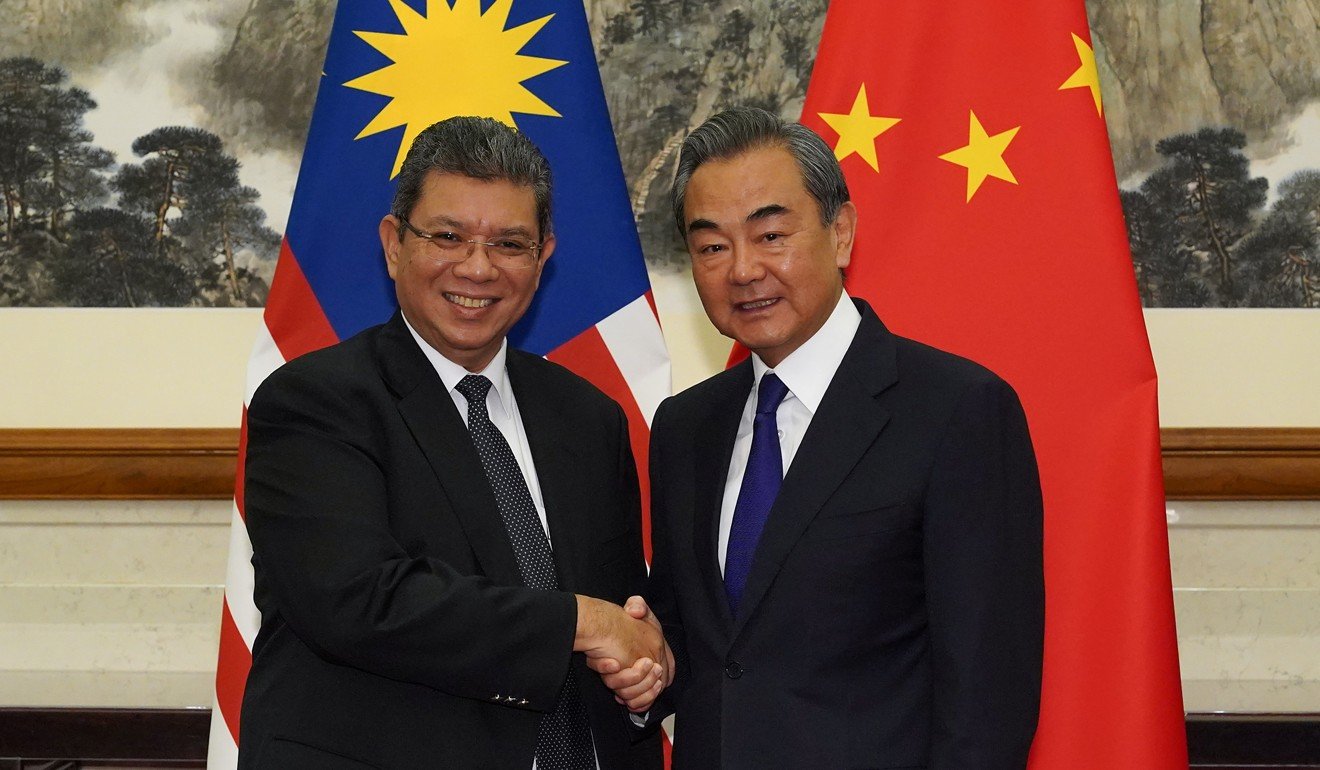SIGN IN/UP
https://www.scmp.com/search
China / Diplomacy
Beijing urges UN commission not to consider Malaysian claim in South China Sea

Laura Zhou
Published: 7:00am, 17 Dec, 2019
920


China’s permanent mission to the UN sent a diplomatic note to its secretary general Antonio Guterres saying Malaysia’s claim “seriously infringed” on its sovereignty. Photo: DPA
Beijing has accused Malaysia of infringing on its sovereignty after its Southeast Asian neighbour filed an extended shelf claim in the
disputed South China Sea
.
China’s permanent mission to the United Nations also urged the UN’s Commission on the Limits of the Continental Shelf (CLCS) not to consider Malaysia’s submission seeking to establish the outer limits of its legal continental margin beyond the 200 nautical mile limit.
“China has internal waters, territorial sea and a contiguous zone based on its Nanhai Zhudao [the South China Sea islands]; China has an exclusive economic zone and continental shelf. China has historic rights in the South China Sea,” the Chinese mission said in a diplomatic note to United Nations secretary general Antonio Guterres last week.
It said the submission by Malaysia, which was made on Thursday, had “seriously infringed on China’s sovereignty, sovereign rights and jurisdiction in the South China Sea”.
“The Chinese government seriously requests that the commission not consider the submission by Malaysia,” the diplomatic note said.
The Chinese foreign ministry on Monday said Beijing had also lodged representations with Malaysia, saying it had infringed on China’s sovereignty and violated “international relations norms”.
The South China Sea dispute explained
Malaysia’s submission was made for the part of its continental shelf that extends beyond 200 nautical miles in the northern area of the South China Sea. The move could help Malaysia to establish rights over all of the seabed and subsoil resources – including oil and gas reserves – that may exist in the area.
SUBSCRIBE TO US CHINA TRADE WAR
Get updates direct to your inbox
SUBMIT
By registering, you agree to our T&C and Privacy Policy
While coastal countries like Malaysia can establish the outer limits of their legal continental margin seaward of their 200 nautical mile limit under the UN Convention on the Law of the Sea, observers said the move was likely to be seen as provocation by China.
“The new limits proposed by Malaysia go through the waters between the Paracel Islands and the Spratly Islands, which overlaps with China’s territorial claim to the area,” said Ding Duo, an assistant research fellow at the National Institute for South China Sea Studies in Hainan. “This is a unilateral move that is not helpful for building mutual trust between the claimants.”
But Ding said the CLCS – a scientific body that does not have the mandate to consider areas that are subject to sovereignty disputes – was unlikely to address the issue, just as it did not step in when Vietnam and Malaysia made a similar joint submission in 2009 over the southern part of the South China Sea.
Beijing was furious at the time and urged then UN secretary general Ban Ki-moon not to review the case.
Collin Koh, a research fellow with the Maritime Security Programme at the S. Rajaratnam School of International Studies at Singapore’s Nanyang Technological University, also noted the 2009 case.
“Malaysia’s claim would have provoked China’s response anyway, in a manner akin to what happened in 2009,” Koh said, adding that the timing was likely to do with meeting CLCS requirements rather than aggravating China.
It comes as Beijing is seeking to push forward negotiations on a code of conduct in the South China Sea and trying to ease tensions with rival claimants to the resource-rich waterway.
China claims almost all of the South China Sea and has built military outposts on artificial islands despite overlapping claims by Brunei, Malaysia, the Philippines, Taiwan and Vietnam.

Chinese Foreign Minister Wang Yi (right) meets his Malaysian counterpart Saifuddin Abdullah in September. The two sides agreed to set up a new dialogue mechanism on South China Sea issues. Photo: Reuters
Beijing and Kuala Lumpur
agreed to set up a new dialogue mechanism
to discuss South China Sea issues in September, when Malaysian Foreign Minister Saifuddin Abdullah visited Beijing.
“Since the first reading of the text to negotiate the code of conduct is complete, Malaysia may be worried that there will be more restrictions on making a submission like this once the code is agreed,” Ding said. “It may also be looking to increase its stake in the [South China Sea] negotiations with China.”
Tensions over the South China Sea have been heightened since July, when Chinese and Vietnamese coastguard vessels became locked in a lengthy stand-off over a Chinese survey ship that made multiple passes near the energy-rich Vanguard Bank in the Spratlys, claimed by both Beijing and Hanoi. The Chinese ships
left the Vanguard Bank area
in October.
Back in May, a Chinese coastguard vessel was seen patrolling in waters near Luconia Breakers, a Malaysian-controlled reef at the southern end of the Spratlys, including an oil and gas block licensed to petroleum company Sarawak Shell, according to the Washington-based Asia Maritime Transparency Initiative, under the Centre for Strategic and International Studies.
Oh Ei Sun, a senior fellow with the Singapore Institute of International Affairs, said growing uncertainty over the contested region had prompted Kuala Lumpur to take the move.
“Malaysia is trying to stake its territorial or exclusive economic claims, at least legally, as soon as possible nowadays as there are murmurs of the claim disputes heating up again,” Oh said.
https://www.scmp.com/search
China / Diplomacy
Beijing urges UN commission not to consider Malaysian claim in South China Sea
- Chinese permanent mission to the United Nations says neighbour has ‘seriously infringed on sovereignty, rights and jurisdiction’
- Kuala Lumpur is seeking to establish the outer limits of its legal continental shelf beyond the 200 nautical mile limit

Laura Zhou
Published: 7:00am, 17 Dec, 2019
920


China’s permanent mission to the UN sent a diplomatic note to its secretary general Antonio Guterres saying Malaysia’s claim “seriously infringed” on its sovereignty. Photo: DPA
Beijing has accused Malaysia of infringing on its sovereignty after its Southeast Asian neighbour filed an extended shelf claim in the
disputed South China Sea
.
China’s permanent mission to the United Nations also urged the UN’s Commission on the Limits of the Continental Shelf (CLCS) not to consider Malaysia’s submission seeking to establish the outer limits of its legal continental margin beyond the 200 nautical mile limit.
“China has internal waters, territorial sea and a contiguous zone based on its Nanhai Zhudao [the South China Sea islands]; China has an exclusive economic zone and continental shelf. China has historic rights in the South China Sea,” the Chinese mission said in a diplomatic note to United Nations secretary general Antonio Guterres last week.
It said the submission by Malaysia, which was made on Thursday, had “seriously infringed on China’s sovereignty, sovereign rights and jurisdiction in the South China Sea”.
“The Chinese government seriously requests that the commission not consider the submission by Malaysia,” the diplomatic note said.
The Chinese foreign ministry on Monday said Beijing had also lodged representations with Malaysia, saying it had infringed on China’s sovereignty and violated “international relations norms”.
The South China Sea dispute explained
Malaysia’s submission was made for the part of its continental shelf that extends beyond 200 nautical miles in the northern area of the South China Sea. The move could help Malaysia to establish rights over all of the seabed and subsoil resources – including oil and gas reserves – that may exist in the area.
SUBSCRIBE TO US CHINA TRADE WAR
Get updates direct to your inbox
SUBMIT
By registering, you agree to our T&C and Privacy Policy
While coastal countries like Malaysia can establish the outer limits of their legal continental margin seaward of their 200 nautical mile limit under the UN Convention on the Law of the Sea, observers said the move was likely to be seen as provocation by China.
“The new limits proposed by Malaysia go through the waters between the Paracel Islands and the Spratly Islands, which overlaps with China’s territorial claim to the area,” said Ding Duo, an assistant research fellow at the National Institute for South China Sea Studies in Hainan. “This is a unilateral move that is not helpful for building mutual trust between the claimants.”
But Ding said the CLCS – a scientific body that does not have the mandate to consider areas that are subject to sovereignty disputes – was unlikely to address the issue, just as it did not step in when Vietnam and Malaysia made a similar joint submission in 2009 over the southern part of the South China Sea.
Beijing was furious at the time and urged then UN secretary general Ban Ki-moon not to review the case.
Collin Koh, a research fellow with the Maritime Security Programme at the S. Rajaratnam School of International Studies at Singapore’s Nanyang Technological University, also noted the 2009 case.
“Malaysia’s claim would have provoked China’s response anyway, in a manner akin to what happened in 2009,” Koh said, adding that the timing was likely to do with meeting CLCS requirements rather than aggravating China.
It comes as Beijing is seeking to push forward negotiations on a code of conduct in the South China Sea and trying to ease tensions with rival claimants to the resource-rich waterway.
China claims almost all of the South China Sea and has built military outposts on artificial islands despite overlapping claims by Brunei, Malaysia, the Philippines, Taiwan and Vietnam.

Chinese Foreign Minister Wang Yi (right) meets his Malaysian counterpart Saifuddin Abdullah in September. The two sides agreed to set up a new dialogue mechanism on South China Sea issues. Photo: Reuters
Beijing and Kuala Lumpur
agreed to set up a new dialogue mechanism
to discuss South China Sea issues in September, when Malaysian Foreign Minister Saifuddin Abdullah visited Beijing.
“Since the first reading of the text to negotiate the code of conduct is complete, Malaysia may be worried that there will be more restrictions on making a submission like this once the code is agreed,” Ding said. “It may also be looking to increase its stake in the [South China Sea] negotiations with China.”
Tensions over the South China Sea have been heightened since July, when Chinese and Vietnamese coastguard vessels became locked in a lengthy stand-off over a Chinese survey ship that made multiple passes near the energy-rich Vanguard Bank in the Spratlys, claimed by both Beijing and Hanoi. The Chinese ships
left the Vanguard Bank area
in October.
Back in May, a Chinese coastguard vessel was seen patrolling in waters near Luconia Breakers, a Malaysian-controlled reef at the southern end of the Spratlys, including an oil and gas block licensed to petroleum company Sarawak Shell, according to the Washington-based Asia Maritime Transparency Initiative, under the Centre for Strategic and International Studies.
Oh Ei Sun, a senior fellow with the Singapore Institute of International Affairs, said growing uncertainty over the contested region had prompted Kuala Lumpur to take the move.
“Malaysia is trying to stake its territorial or exclusive economic claims, at least legally, as soon as possible nowadays as there are murmurs of the claim disputes heating up again,” Oh said.
